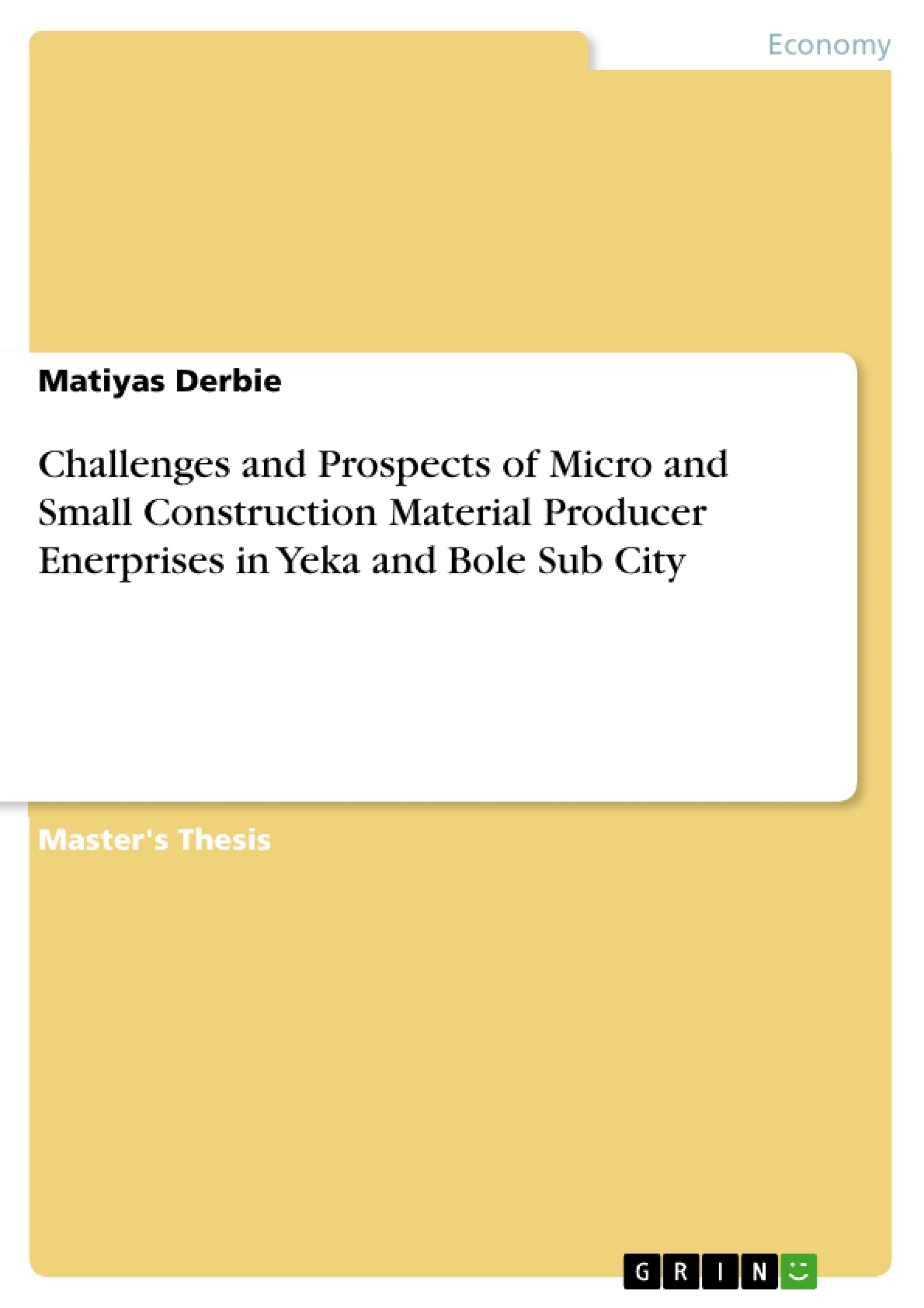Micro and small industries have a significant and vital role in the economies of developed countries. Especially in developing countries small scale industries considered as a backbone of their economies. In regard of this, the study intends to examine the challenges and prospects of Micro and Small enterprises in construction sector, specifically on the construction material producer enterprises in Yeka and Bole sub-cities. To satisfy the objectives of this study, descriptive and inferential analyses were used. The information was collected from the sample of 150 MSEs with face to face interviews. The sampled MSEs were selected by simple random sampling technique. Besides that, the study draws out with nine key challenges which seem to influence the profitability of MSEs in both sub-cities. The results point to that, there is a strong relationship between the independent and dependent variable. Furthermore, the selected explanatory variables may significantly explain the variations of the explained variance at 5% and 10% level of significance. Based on the results, financial, managerial, raw material, work premises and technologies are the main challenges of MSEs, those to be profitable and successful. Therefore, recommendations are forwarded to government bodies, micro and small construction material producer enterprise and to other researchers.
Inhaltsverzeichnis (Table of Contents)
- CHAPTER ONE
- 1.1 Introduction
- 1.2 Statement of the problem
- 1.3 Objective
- 1.3.1 General objective
- 1.3.2 Specific objective
- 1.3.3 Research question
- 1.4 Significance of study
- 1.5 Scope and Limitations of the study
- 1.5.1 Scope of the study
- 1.5.2 Limitations
- 1.6 Organization of the paper
- CHAPTER TWO
- 2. Literature review
- 2.1 Theoretical reviews
- 2.1.1 Definitions of Micro and small enterprises
- 2.1.2 Definitions of MSEs in Ethiopia
- 2.1.3 Improved definitions of MSE
- 2.1.4 Theoretical reviews on micro and small enterprises
- 2.1.5 The firm growth theory
- 2.1.6 The labor surplus theory
- 2.1.7 The output-demand theory
- 2.1.8 Micro and small enterprise in poverty reduction
- 2.2 Empirical reviews
- 2.3 Conceptual framework
- CHAPTER THREE
- 3. RESEARCH METHODOLOGY
- 3.1 Research design
- 3.2 Sampling technique
- 3.2.1 Sample size
- 3.3 Description of variables
- 3.4 Specification of Econometric Model
- 3.5 Data nature and collection methods
- 3.6 Data processing and analysis
- 3.6.1 Data processing
- 3.6.2 Data analysis
- 3.7 Instrument development
- 3.7.1 Instrument Validity
- 3.7.2 Instrument Reliability
- 3.8 Ethical considerations
- 3.9 Study area profile
- CHAPTER FOUR
- 4. DATA PRESENTATION, ANALYSIS AND INTERPRETATION
- 4.1 Socio economic characteristics of the Enterprises
- 4.2 Descriptive statistics
- 4.3 Inferential analysis
- CHAPTER FIVE
- 5. CONCLUSIONS AND RECOMMENDATIONS
- 5.1 Conclusions
- 5.2 Recommendation
Zielsetzung und Themenschwerpunkte (Objectives and Key Themes)
This MSc thesis aims to analyze the challenges and prospects of micro and small construction material producer enterprises in Yeka and Bole Sub City, Addis Ababa, Ethiopia. The research seeks to understand the factors affecting their growth and development, identify the challenges they face, and propose recommendations for improvement. The study focuses on understanding the economic and social significance of these enterprises, their role in poverty reduction, and the impact of government policies on their operations. The research also explores the challenges faced by these enterprises, including access to finance, market competition, and regulatory burdens.
- The challenges and opportunities faced by micro and small construction material producer enterprises.
- The role of these enterprises in economic development and poverty reduction.
- The impact of government policies on the operations and growth of these enterprises.
- The importance of access to finance and other resources for the success of these enterprises.
- The need for a supportive policy environment to foster the growth and development of micro and small construction material producer enterprises.
Zusammenfassung der Kapitel (Chapter Summaries)
Chapter one provides a general overview of the research, outlining the problem statement, objectives, significance, and scope of the study. It also presents the research questions and the organization of the paper. Chapter two delves into a comprehensive literature review, examining both theoretical and empirical studies related to micro and small enterprises. This chapter explores various definitions, growth theories, and the role of these enterprises in poverty reduction. Chapter three outlines the research methodology employed in the study, including the research design, sampling technique, data collection methods, and data analysis techniques. This chapter also discusses ethical considerations and the study area profile. Chapter four presents and analyzes the data collected from the survey of construction material producer enterprises. This chapter examines the socio-economic characteristics of these enterprises and utilizes descriptive and inferential statistical methods to analyze the data. While the final chapter, Chapter five, is excluded for spoiler reasons, it is anticipated to summarize the findings of the research and provide conclusions and recommendations based on the data analysis.
Schlüsselwörter (Keywords)
Micro and small enterprises, construction material production, challenges, prospects, economic development, poverty reduction, access to finance, government policies, Ethiopia, Addis Ababa, Yeka Sub City, Bole Sub City.
- Citar trabajo
- Matiyas Derbie (Autor), 2017, Challenges and Prospects of Micro and Small Construction Material Producer Enerprises in Yeka and Bole Sub City, Múnich, GRIN Verlag, https://www.grin.com/document/412722



